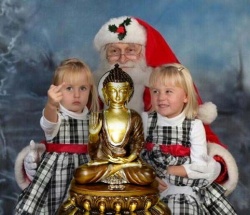The Second Bardo
If the soul is still not liberated at this stage, it will descend into the second bardo, which is said to last for two weeks. The second bardo is also divided into two parts; in the first, the soul of the deceased encounters what are referred to as "the Peaceful Deities." On each of the seven days, a particular Buddha-being will appear in radiance and glory, with a bevy of angelic attendants. At the same time, on each day in turn there will shine a light from one of the six worlds of the Buddhist universe, called "Lokas" (the basic meaning is "place"; our English words "location" and "locale" are derived from the same Sanskrit root).
On the first day of the second bardo, there appears to the soul the divine Father-Mother - that is, the supreme deity of the universe, transcending all dualities, including the division into sexes. The next step in the destiny of the soul is determined by his reaction to this God. If his life on earth was well lived, he will now be in a state of purity and grace, and he will enter into the joy of the God and attain liberation. If on the other hand he has lived an ignoble and impious life, the effects of his bad karma will cause the intense radiant presence of the God to strike fear and terror in his heart, and he will be drawn instead to the softer light of the Deva-Loka, which has dawned along with this deity. This is still a fairly attractive fate, for the Devas are the Gods (or angels), and their Loka is equivalent to the Christian heaven; however, the Buddhist teaching is that even heaven is not the highest spiritual objective, because it is still only a temporary state in the manifest universe. Liberation is believed to be the only final and permanent resting-place for the soul, an un-manifest state beyond all existence.
On the second day, there appears the second-highest God in the Buddhist pantheon - in fact, he is actually the Second Person in the literal Buddhist Holy Trinity. At the same time, there dawns a smoky light from hell; and here we note that, just as the Buddhist heaven is not a permanent, eternal state, neither is its hell. Even the most wretched souls will eventually work their way out of even the deepest pit of hell, just as even the highest and purest souls will eventually lose their footing in heaven and descend again into the cycle of death and rebirth. Liberation is the only way out.
Once again, if the soul responds to the "dazzling white light" of the second God with the joy of a pure heart, he will be liberated thereby; but if he specifically reacts with ANGER from having indulged in this vice on earth, he will recoil from the light in fear and be drawn into hell.
The pattern is repeated on the third day; this time it is the fault if egotism that will cause the soul to react to the God with fear, and he will be drawn to the human world, where his next incarnation will thereby take place. On the fourth day dawns the God of Eternal Life; if the soul has a negative reaction to him because of miserliness and attachment, he will be drawn toward rebirth in the Preta-Loka, a world of "hungry ghosts" who have huge stomachs and throats the size of pinholes, and so they wander about in a constant state of unsatisfied ravenous desire. On the fifth day comes God in the form of an Almighty Conqueror; this time it's jealousy that will unseat the soul, and he will be born into the Asura-Loka, a world of fierce warrior-deities (or demons). On the sixth day all the deities return and dawn together, along with the lights from all six Lokas. On the seventh day there appear the Knowledge-Holding Deities, who are more fierce and demonic-looking than those that have previously dawned; and in fact they are sort of a transitional element to the next stage of the second bardo, where the soul encounters the wrathful deities. Meanwhile, if because of stupidity the soul cannot face the Knowledge-Holding Deities, he is drawn toward the Brute-Loka - that is, he will be reborn on earth as an animal.
In the second week of the second bardo, the soul meets seven legions of Wrathful Deities: hideous, terrifying demons who advance upon him with flame and sword, drinking blood from human skulls, threatening to wreak unmerciful torture upon him, to maim, disembowel, decapitate and slay him. The natural tendency, of course, is for the soul to attempt to flee from these beings in stark, screaming, blood-curdled terror; but if he does, all is lost. The instructions at this stage of the Bardo are for the soul to have no fear, but rather to recognize that the Wrathful Deities are really the Peaceful Deities in disguise, their dark side manifesting as a result of his own evil karma. The soul is told to calmly face each demon in turn and visualize it as the deity it truly is, or else as his own tutelary deity; if he can do this, he will merge with the being and attain the second degree of Liberation, that lesser aspect of it which is now the best he can hope for here in the second bardo.
Furthermore, he is told to awaken to the fact that all these fearsome creatures are not real, but are merely illusions emanating from his own mind. If he can recognize this, they will vanish and he will be liberated. If he can't, he eventually wanders down to the third bardo.
